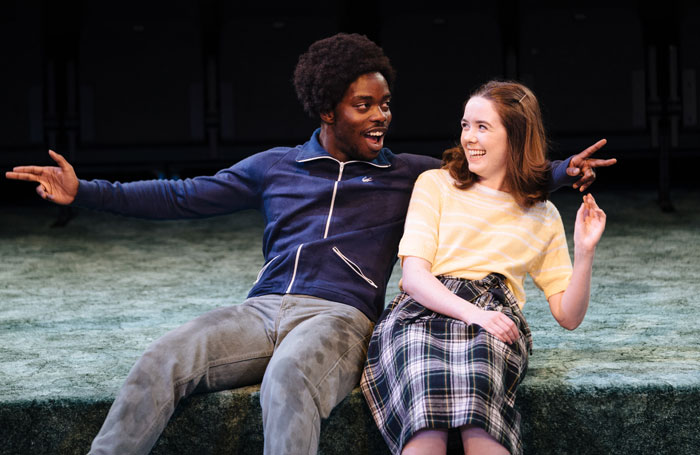Rating: 4/5 stars
A cultural no-man’s land in 1980’s Britain
The Bush Theatre is currently staging Strange Fruit as part of their Passing the Baton initiative, which celebrates artists of colour who have achieved excellence in play-writing. Written by Caryl Phillips in 1981, Strange Fruit explores cultural displacement, motherhood and masculinity. Unwelcome in England and cut off from the Caribbean, Phillips vividly brings to life a family imploding within their own home, with nowhere else to forge a new one.

Mother to two frustrated freedom-fighting young men, Vivian finds herself accused of being “Miss Chalkie” for her determination to keep up appearances in 1980s England. Rakie Ayola beautifully portrays Vivian as a repressed individual, a woman who refuses to show her emotions as she struggles to achieve a better life for her family. Having emigrated from the Caribbean as a single mother, she has locked out her past in an effort to move forward, leaving her sons angry and resentful as they search for an identity in vain. Her speech recalling horrific racial abuse is one of the most powerful, if difficult to watch, moments of the production.
Strange Fruit displays Phillips’ ability to illustrate ongoing emotional turmoil bubbling to the surface before erupting. Jonathan Ajayi plays the unstable younger son Errol, exuding anger out in every word he speaks, under the weight of his position as an educated black immigrant. Errol makes loose plans to join “The African Freedom Fighters” but spends most of his time verbally abusing his white girlfriend Shelley. Tilly Steele plays the character to perfection, allowing the audience to both laugh and squirm uncomfortably at her naivety. Errol’s unawareness of Shelley’s pregnancy underlines the plot, the mother and son tension increased by the fact that Vivian knows. The play would fall short without this element, as the plot is somewhat laboured in its lengthy unravelling, having to incorporate an unexpected twist towards the end.

When older brother Alvin (Tok Stephens) returns from a visit to the Caribbean, Errol refuses to accept Alvin’s disillusionment with their cause, calling his brother a “white boy”. The production effectively heightens the inescapable friction between black and white. Debra Michaels, as lively neighbour Vernice, delivers a Caribbean accent, strongly contrasting Vivian’s anglicised teacher’s inflection. Staging the play in the round helped to increase the sense of mental entrapment and not fitting into either culture, although it meant some stage action was not visible for the parts of the audience. The gaudy turquoise carpet certainly added to the claustrophobia. In this space, it is Shelley who is the outsider.
At nearly 3 hours long, the play is often bogged down by complex repetitive arguments which detract from the theatrical interest of the play. Nevertheless, Phillips’ writing remains potent as the characters’ headspaces reflect the cultural Catch 22 (a phrase Errol uses to bully his mother out of demanding anything from her sons) of emigrating to England as a person of colour. There is clear observational detail in each performance and the production succeeds in evoking sympathy for all of the characters.
It is difficult to understand why Errol displays his frustration in the way that he does. However, the reason for his lack of purpose and feelings of hopelessness are obvious, as he struggles to find a place in a world where he can never quite fit in. Unfortunately, many of the themes of this play would still be relevant to a young, black and male audience today. Although afforded the privilege of education, Alvin and Errol are denied the chance to form an identity separate to society’s expectations of them. For that reason, The Bush Theatre’s production of Strange Fruit is certainly recommendable, posing some questions surrounding race and identity that remain unanswered in 2019 Britain.


